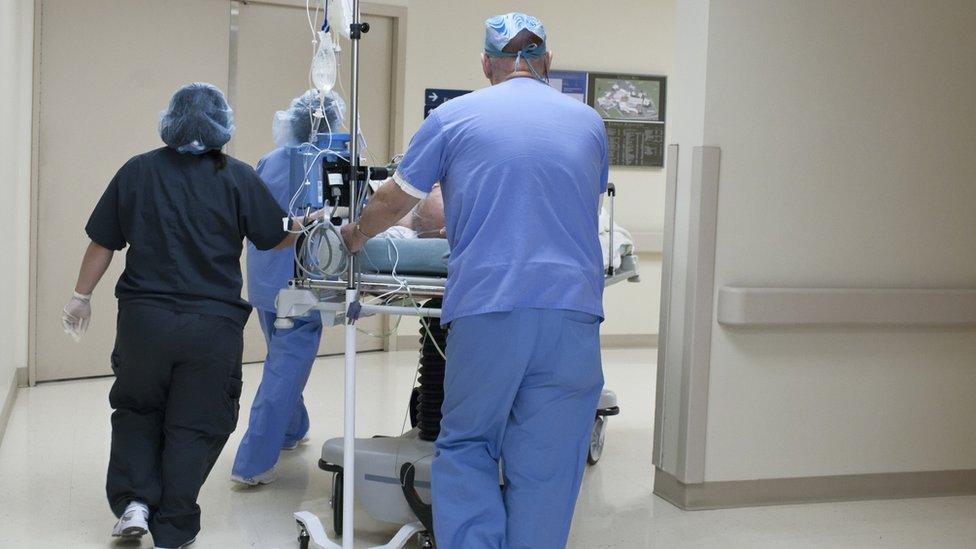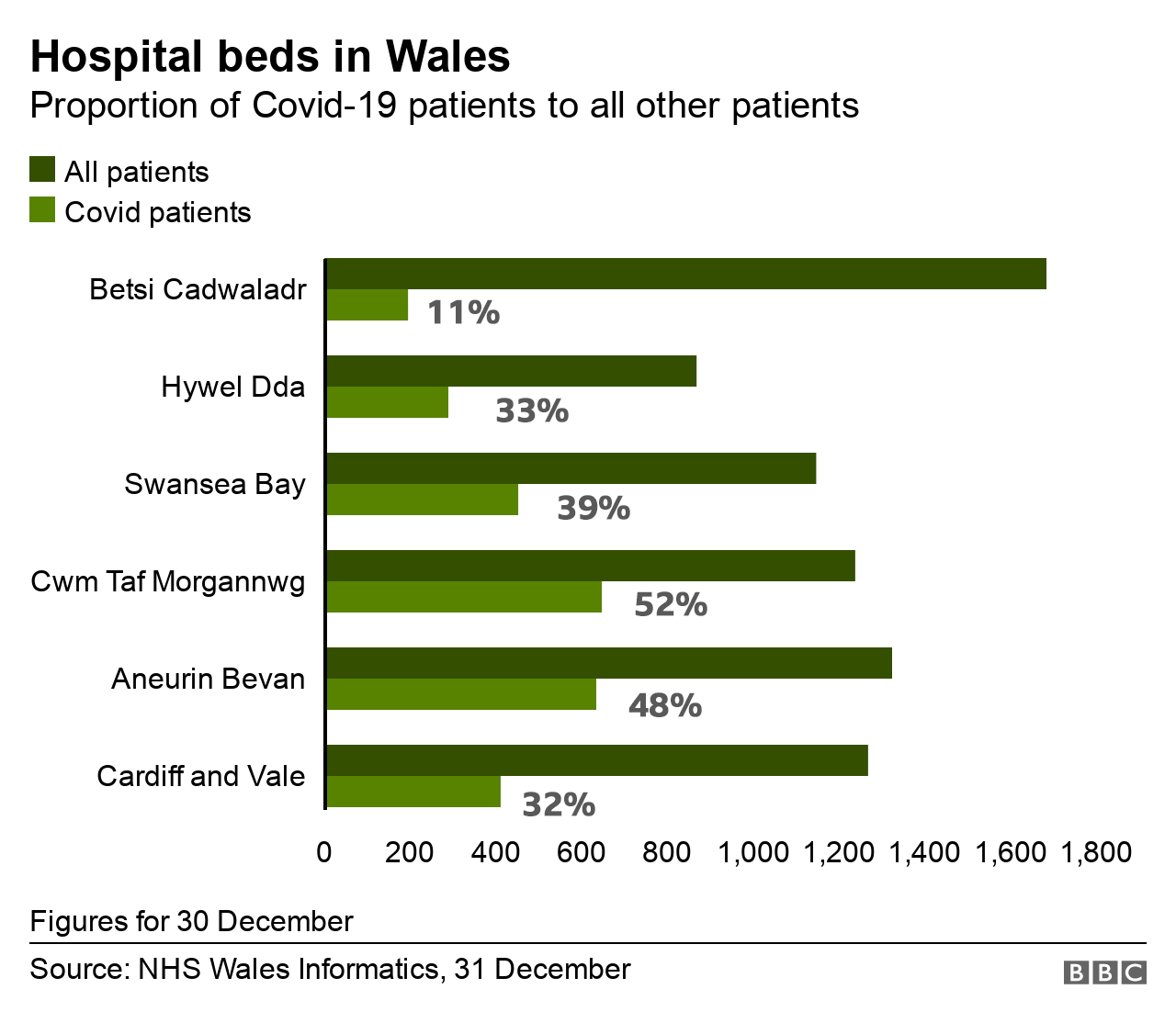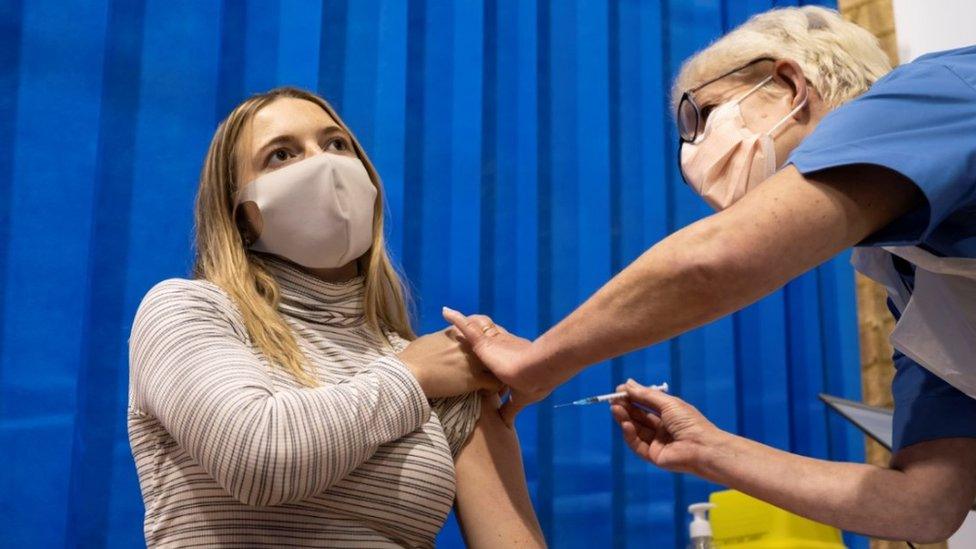Covid: Wales' hospital cases hitting highest levels
- Published

Covid-19 patients made up 34% of all people in hospital on 30 December
More than a third of patients in hospital are being treated for Covid-19, new figures from NHS Wales show.
In Cwm Taf Morgannwg, more than half of patients have the virus and the health board said the situation was "extremely serious".
Numbers of those with Covid in critical care or on ventilation are the highest it has been in the pandemic.
Senior managers pleaded with people not to gather for New Year's parties to contain the spread of infections.
The 2,610 Covid patients in hospital across the country on Wednesday - up 252 (11%) on the previous week - is a new record.
The number of recovering patients - those still too ill to be discharged - are also at their highest levels.


Figures from NHS Wales Informatics, the first since before Christmas, show:
Cardiff and Vale health board had seen a 21.5% rise in Covid patients in a week
Numbers have risen over the week in all areas, while Cwm Taf Morgannwg has the most patients - 627 - which means 52% of all patients in the health board's hospitals have Covid-19
The proportion is 48% in Aneurin Bevan health board
Cardiff and Vale health board announced it was stopping routine surgery and outpatient appointments throughout January, so staff could focus on urgent and emergency care, including critical care.
It said its emergency services, including emergency and cancer surgery, would continue.
"I would ask the public to remain mindful of the pressures on primary care and hospital services and to access urgent care appropriately," said chief operating officer Steve Curry.

Of those in hospital on 30 December - 1,618 were confirmed Covid patients, 181 were suspected of having Covid and 811 were recovering from the virus. Recovering patients were not counted until the end of May, but this number is by far the highest level we have seen since then
Covid patients made up 34% of all patients in hospital. This compares with about 18% at the end of May and has been steadily rising in the past two weeks. Patients who are recovering from Covid - still in hospital but not showing symptoms for 14 days or more - make up more than 10.5% of those in hospital

There were 119 patients being treated on invasive ventilated beds, including in critical care, for confirmed or suspected coronavirus on 30 December - 17 more than a week ago, but figures have been at their highest since late April.
'Extremely challenging'
At the very peak of the pandemic in critical care, hospitals in Wales were looking after 164 patients.
Cwm Taf Morgannwg health board had 30 patients in critical care or on invasive ventilation on 30 December. The number has been as high as 36 in recent days, and these are the highest numbers it has seen in the pandemic.
The health board said it was under "significant pressure with unprecedented demand and this is extremely challenging for our staff".
"While it might be tempting to have a New Year's party or spend time with family and friends, gathering together puts yourself and your loved ones at risk," said medical director Dr Nick Lyons.
"By taking such actions we also risk increased hospital admissions and sadly, a rise in the number of people dying from this virus. By following the rules, we can protect each other and save lives."
Betsi Cadwaladr health board has seen some of the highest numbers it has experienced in its critical care units - there were 19 on Wednesday, but there were as many as 24 just after Christmas.
Dr Richard Pugh, an intensive care consultant at Glan Clwyd Hospital in Bodelwyddan, Denbighshire, said: "Cases are going up week by week in north wales and in north-east Wales the number of cases per week is above the average for Wales.
"This means things are going to become more difficult in the coming weeks.
"This week has been particularly demanding for critical care, we are considerably above our funded routine capacity, we've extended into non-critical care areas such as theatre recovery and we're having to anticipate the knock-on effect of increasing community transmission."
'Precarious'
Hywel Dda health board said it was dealing with the highest number of cases since the pandemic began.
Staff sickness was adding to the challenge, with 900 absences being reported daily.
"We are actively reaching out to staff internally to see who could be redeployed across the organisation to support our pressure points in terms of staffing availability, particularly in critical care and respiratory care," said Andrew Carruthers, director of operations.
Aneurin Bevan said its hospitals were "very busy," while Swansea Bay said the situation was "precarious" and "very serious" including the deaths of 43 patients in the last week. It too has 700 staff off work with the virus or self-isolating.


Hospital admissions are also at their highest point since mid-May.
Daily admissions of confirmed and suspected Covid-19 cases were running at a daily seven-day average of 123 on 30 December.
Covid cases make up more than 17% of all hospital admissions, but the figures do not break down how many people caught Covid while in hospital.
Latest infection figures show there were 205 new hospital onset cases in the week to 27 December, according to Public Health Wales.
In total, nearly 2,900 Covid cases linked to hospital infections have been reported since September.
On Wednesday, the BMA in Wales said vaccinating staff had to be a priority and it was concerned to hear some NHS staff were struggling to access one.
"You can't run a health service without staff and with many isolating or actually having the virus themselves, we're in danger of a collapse," said Dr David Bailey, chairman of BMA Wales.
- Published31 December 2020

- Published28 May 2024
